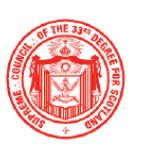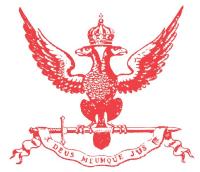Ancient and Accepted Scottish Rite - Supreme Council for Scotland and the Thirty Third and Last Degree
14 September 23
Affectionately known as the ‘Rose Croix’, the Ancient and Accepted Scottish Rite under the Supreme Council for Scotland is the oldest Rite of its kind in Australia, having had a presence in Queensland since January 1879 and in New South Wales since November 1892. Today there are Chapters in the Eastern States and in Western Australia, all owing allegiance to Scotland but working together in regional groupings as semi-autonomous units, known as Provinces.
Membership Qualifications
Membership is open to Master Masons who profess a belief in the Christian Trinity and is by invitation. However, enquiries are invited and welcomed from Christian Master Masons who are ready to extend their researches into this fascinating and meaningful branch of Freemasonry.
Teachings
The Scottish Rite under Scotland is a Christian Order which teaches Christian principles and high morals. This is especially so in the ‘working’ Degrees of the Rite, the Eighteenth and Thirtieth Degrees, where the search for truth and the dedication of oneself to the service of God are the key teachings. The ‘Inter- mediate Degrees’, ie. those between four and seventeen, and those between nineteen and twenty-nine, are ‘Conferred’ on Candidates to prepare them for the important step they are proposing to take.
The Eighteenth, or Sovereign Prince Rose Croix Degree sees Candidates embarking on a quest to find the lost Word of a Master Mason. Along the way, the Christian Principles of Faith, Hope and Charity are encountered and shown as key ‘milestones’ pointing to the ultimate destination. Having learned these important lessons, the searchers are led to the lost Word, where further valuable teaching is available. Upon re-entering the Sovereign Chapter triumphantly with their prize, the Candidate and his Conductor are received by the Most Wise Sovereign, or Master, and other Office Bearers and the Candidate is rewarded for his efforts by being Knighted as a Sovereign Prince Rose Croix.
This Degree contains very meaningful and moving ceremonies, and Candidates never fail to be affected in both the Masonic and the personal aspects of their life by the significance of its teachings. Kadosh Degree, the Candidate seeking admission is repeatedly urged to consider carefully before committing to the philosophic principles of Membership. By reflection and contemplation, by listening to the requirements of a Philosopher, and finally by dedicating himself to these same principles, the Candidate is brought to the point of admission to the Sovereign Council, where further symbolic teachings await him. Having approached the Sovereign Council as a Grand Scottish Knight of Saint Andrew of Scotland, or Twenty Ninth Degree Mason, the successful Candidate leaves as a fully-fledged Grand Elect Knight Kadosh, holding the Thirtieth Degree.
It is important to note that admission to the Thirtieth Degree is a Promotion under the Supreme Council for Scotland and must not be considered a right. Those holding the Thirtieth Degree have well and truly earned it and are held in high esteem amongst their Brethren.
Higher Rank
As with any aspect of Freemasonry, there are what are called ‘Grand Ranks’. In the Scottish Rite under Scotland these are Degrees that are conferred on worthy Members of the Rite by Supreme Council, upon the recommendation of the Deputy for the Province.
Thirty First Degree Masons, or Grand Inspector Inquisitor Commanders, administer the Judicial aspect of the Rite. Thirty Second Degree Masons, or Sublime and Valiant Princes of the Royal Secret, are the Military Commanders of the Rite and form an impenetrable barrier to those who would gain admission falsely. The Ceremonies of these Degrees are worked within the Province following approval by Supreme Council.
The Thirty Third (and Last) Degree, where Members are called Sovereign Grand Inspectors General, is the highest Degree in Freemasonry. This Degree can only be worked by Supreme Council and is conferred upon Brethren who are appointed as their Deputy in a Province, either in Scotland or overseas. Holders of the Thirty Third Degree are the Rulers of the Rite and their numbers are necessarily small. Members made Deputy of a Province, both in Scotland and in other parts of the world where Scottish Constitution Chapters and Councils meet, are appointed by Supreme Council and hold their Office during the pleasure of Supreme Council, without having a pre-determined date of retirement.
The Province of New South Wales has three additional active Members of the Thirty Third Degree, who are appointed as Administrators of the Northern, Central and Western Districts. They are appointed for a five-year term, during which they act as equivalents to the Craft Office of District Grand Inspector of Workings. Each submits his report to the Deputy for the Province, who provides an Annual Report to Supreme Council. This Annual Report sets out the progress of the Rite in the Province during the previous year and is published in full in the Annual Reporter, compiled and issued by the Supreme Council for Scotland and despatched around the world to constituent bodies and to other Supreme Councils of the Rite.
Background and History
Sovereign Chapters working the Eighteenth, or Sovereign Prince Rose Croix Degree, sprang out of the legacies left by the old Military Chivalries of Christendom and began to emerge in France in 1740. After many changes and modifications, the Supreme Council for Scotland was Consecrated in 1846 as a direct descendant of the Supreme Council in Charleston, South Carolina. It was from the recently established Supreme Council for Scotland in Edinburgh that the Sovereign Chapters in the Australian Colonies derived their Charters within its first half century of operation.
It is this history of the practice of our Rites and Ceremonies in Australia, this line of Christian Masons stretching back into the Nineteenth Century even before the creation of the United Grand Lodge of New South Wales & the Australian Capital Territory, that today’s Members hold very dear. Throughout that time the lessons of the Order have been taught to many eminent Freema- sons, including at least one Grand Master of the UGL of NSW & ACT, Most Worshipful Brother, His Honour Judge Hugh Montgomerie Hamilton, who was Grand Master from 1909 to 1910, and whose name lives on in one of our Sovereign Chapters meeting in Sydney to this day.
Representation
Scottish Constitution Sovereign Chapters and Councils meet quarterly in Masonic Centres throughout the Sydney Region stretching from Gosford in the north and Liverpool in the south to Lawson in the west. Dress requirements generally follow established Masonic patterns according to time and season. Costs include a joining fee of approximately $160 and annual dues of $65. New Regalia, consisting of apron, collar and jewel, can be purchased for less than $700, although high quality Scottish Pattern Regalia is available from overseas suppliers for much less. Swords form part of the Regalia, although wearing a sword is not compulsory.
For further information contact: The Provincial Grand Secretary Ill. Bro. Arthur Macken Mobile: 0438 767 264 Email: [email protected] or visit https://www.scottishrite.com.au/


